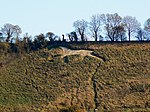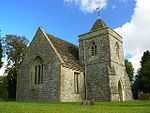Broad Town White Horse is a hill figure of a white horse located in the village of Broad Town, Wiltshire, England. One of eight canonical hill figures in Wiltshire depicting a white horse, it is carved into a 45° slope above Little Town Nursery Farmhouse and is visible for 20 miles. The horse is 80 by 60 feet (24 by 18 m) in size and composed of fine compacted chalk with well defined edges. Although its origin is uncertain, according to William Plenderleath, writing in 1885, it was cut in 1864 by a William Simmonds, who held the farm then. Simmonds claimed later that it had been his intention to enlarge the horse gradually over the years, but he had to give up the farm and so did not have the opportunity.The white horse serves as an icon for the village of Broad Town and is generally regarded as one of the most animated white horse figures in Wiltshire, and has been noted for being both conspicuous, due to its being visible for many miles, and the "secret white horse," due to its rural location away from main roads. The horse regularly fell into neglect over time, and scouring and maintaining the horse was frequently a problem until 1991, when the Broad Town White Horse Restoration Society was formed by local villagers to regularly scour and maintain the horse, which they have continued to do ever since.








